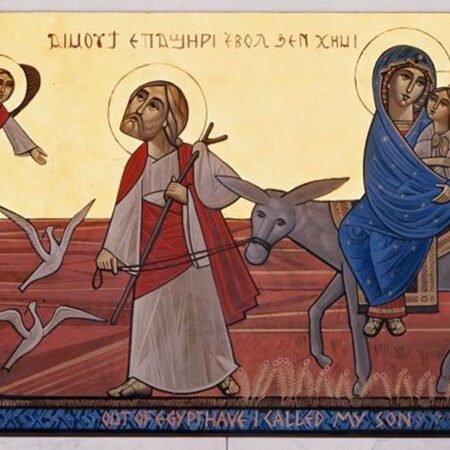The Entry of our Lord into Egypt
“Out of Egypt I called my Son”
Pashons 24, 1741 – June 1st, 2025

On the 24th day of the Coptic Month of Pashons (June 1), the Church commemorates the entry of our Lord into Egypt. Fittingly, on this day, we read Matthew 2:13-23. In this passage from St. Matthew, after Christ was born, an Angel advised Joseph to take the Holy Family into Egypt because Herod wanted Jesus dead. In going into Egypt, Isaiah 19:1 was fulfilled. While the Holy Family was in Egypt, Herod killed all the male children that were two or younger, thus fulfilling what Jeremiah said in Jeremiah 31:15. Once Herod was dead, the angel told Joseph to go back to Israel, thus fulfilling the prophecy from Hosea 11:1. Since Herod’s son was reigning over Judea at the time, Joseph took his family and settled in Nazareth.
While in Egypt, though not explained in the Bible, there are records that explain where the Holy Family went in Egypt. While in Egypt, Christ performed many miracles. For example, when the Holy Family went to what is now, El-Mahamma, there was a water spring that welled up from the ground. The water from this spring cured many people from their illnesses. Additionally, in many of the places where the Holy Family visited, when they arrived, the Egyptian idols were destroyed. Furthermore, the Lord established an altar in the middle of Egypt in what is now the El-Muharraq monastery. This altar is particularly important as it is a fulfillment of Isaiah 19:19. For brevity, every stop of the Holy Family’s itinerary is not listed here, but there are maps and records listed in the further readings.
Liturgically, the Entry of our Lord into Egypt, is one of the seven minor feasts of the Lord. Subsequently, there is a specific doxology, verse of the cymbals, Gospel response, Watos/Adam Espasmos, and concluding hymn. Hymns are to be sung in the joyful Singari tune as well.
According to His Grace Bishop Dimetrius, there are many spiritual meanings that can be taken from this reading. Firstly, by going into Egypt, the Lord removed his anger from Egypt. In the Old Testament, God showed His wrath on the Egyptians through the 10 plagues. However, by sending His Son across Egypt, the Father is renewing and purifying what He once cursed. This is then a good analogy to repentance–where one goes from a life of condemnation to a life of salvation. Christ blessing the once cursed land of Egypt shows how repentance is for everyone. Additionally, through this reading, we have an example of what to do when there is sin around us. When Herod was massacring the children of Bethlehem, Joseph escaped. It is important to note that this was not done out of cowardness, but was done to fulfill the will of God. Just as how the Holy Family (and subsequently Christ) escaped from evil, likewise we should flee when there is sin that is around us.
In brief, this feast is important for many reasons. During this era of Christ’s childhood, many prophecies were fulfilled. Furthermore, Christ showed us the power of repentance. The place that God originally cursed with the 10 plagues during the time of Moses is the birthplace of monasticism and the Theological School of Alexandria. Finally, God gave us an example of how to flee when evil surrounds us.
May the blessings of this feast be with us all.
Further Readings:
- Spiritual Contemplations about Feast of Entry of Lord into Egypt
- Liturgical/Rites
- Historical Account
- 24 Bashans – Pachans Month – Coptic Synaxarium (Coptic Orthodox Calendar: Daily Synaxarion) | St-Takla.org
- Coptic Reader Synaxarium

